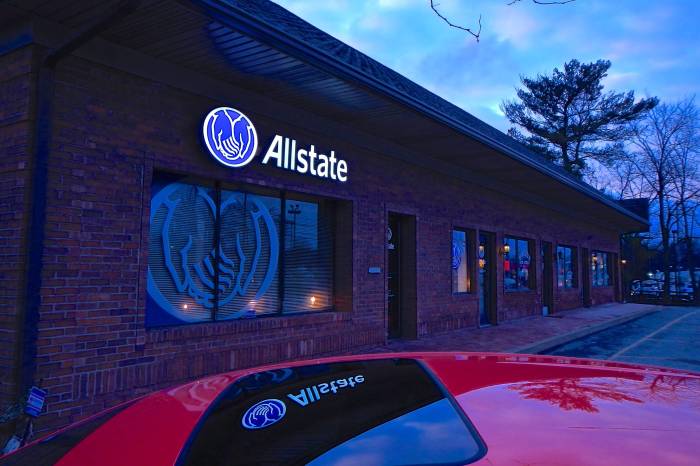Allstate homeowners insurance lawsuit – Allstate, one of the largest homeowners insurance providers in the United States, has been involved in numerous lawsuits over the years. These lawsuits cover a wide range of issues, from claims denials and inadequate settlements to allegations of bad faith practices and unfair business dealings. Understanding the common types of lawsuits, the legal process involved, and how to protect yourself as a policyholder is crucial.
This comprehensive guide aims to provide a detailed and informative overview of Allstate homeowners insurance lawsuits.
Common Types of Allstate Homeowners Insurance Lawsuits
Lawsuits against Allstate related to homeowners insurance frequently fall into several key categories:
Claims Denials and Inadequate Settlements
One of the most common reasons for lawsuits against Allstate involves disputes over claims denials or the inadequacy of offered settlements. Policyholders may find their claims unjustly denied, often due to technicalities in the policy or disagreements over the extent of damages. In such cases, policyholders may sue Allstate to compel them to honor their contractual obligations and provide fair compensation for their losses.
This can include damages to the property itself, as well as additional living expenses if the home becomes uninhabitable due to the covered event.
Bad Faith Claims Handling
Allstate, like other insurance companies, has a duty to act in good faith when handling claims. Lawsuits alleging bad faith often arise when policyholders believe Allstate has intentionally delayed, denied, or underpaid their claims. This can include tactics like unreasonable delays in investigations, failure to properly assess damages, or engaging in aggressive negotiation tactics aimed at minimizing payouts.
Proving bad faith requires demonstrating that Allstate acted with malice or a conscious disregard for the policyholder’s rights. These cases often result in significant damages beyond the initial claim amount.

Source: jiowhatsapp.com
Unfair Business Practices, Allstate homeowners insurance lawsuit
Some lawsuits against Allstate allege unfair business practices, such as deceptive advertising, misrepresentation of policy terms, or discriminatory practices in claims handling. These cases are often complex and require a thorough understanding of insurance regulations and consumer protection laws. Examples might include misleading advertising about coverage limits or failing to disclose important policy exclusions. These types of lawsuits often involve class-action litigation, where multiple policyholders join forces to pursue a collective remedy.
Natural Disaster Claims
Following major natural disasters like hurricanes, floods, and wildfires, Allstate has faced numerous lawsuits related to claims handling. The sheer volume of claims following such events can lead to backlogs and delays, increasing the likelihood of disputes. Policyholders may allege inadequate coverage for damage caused by the disaster, improper assessment of losses, or unreasonable delays in processing claims.
The complexities of assessing damage in large-scale disaster scenarios can often contribute to these types of lawsuits.
The Legal Process of Filing a Lawsuit Against Allstate: Allstate Homeowners Insurance Lawsuit
Filing a lawsuit against Allstate, like any insurance company, involves several steps:
- Gathering Evidence: This includes the insurance policy, claim documentation, photos and videos of the damage, repair estimates, and any communication with Allstate.
- Consulting with an Attorney: An experienced attorney specializing in insurance law is crucial. They can assess the strength of your case, advise on legal strategies, and handle negotiations and litigation.
- Filing a Complaint: The attorney files a formal complaint with the appropriate court, outlining the claims and seeking specific relief (e.g., payment of damages, compensation for bad faith).
- Discovery Phase: Both sides exchange information, documents, and evidence. This phase can involve depositions (sworn testimony) and interrogatories (written questions).
- Negotiation and Settlement: Many cases settle out of court through negotiation between the parties. An attorney can help secure a favorable settlement.
- Trial: If a settlement cannot be reached, the case proceeds to trial. The judge or jury will hear evidence and determine the outcome.
Protecting Yourself as an Allstate Policyholder
To minimize the risk of disputes with Allstate, policyholders should:
- Read your policy carefully: Understand your coverage limits, exclusions, and the claims process.
- Document everything: Keep detailed records of all communication with Allstate, including emails, letters, and phone calls. Take photos and videos of any damage.
- Report claims promptly: Follow the claims process Artikeld in your policy.
- Keep accurate records of expenses: Maintain detailed records of all expenses related to the damage, such as repair costs and additional living expenses.
- Seek legal counsel if necessary: Don’t hesitate to contact an attorney if you encounter problems with your claim.
Frequently Asked Questions (FAQ)
- Q: How do I file a complaint against Allstate? A: You should first attempt to resolve the issue internally with Allstate. If that fails, you should consult with an attorney who can advise you on the best course of action, which may include filing a formal complaint with your state’s insurance department or filing a lawsuit.
- Q: What damages can I recover in a lawsuit against Allstate? A: Damages can include the cost of repairs or replacement of damaged property, additional living expenses, lost wages, emotional distress, and punitive damages (in cases of bad faith).
- Q: How long does an Allstate homeowners insurance lawsuit take? A: The duration of a lawsuit can vary significantly, depending on the complexity of the case, the volume of evidence, and the court’s schedule. It can range from several months to several years.
- Q: Do I need a lawyer to sue Allstate? A: While not strictly required, having an experienced attorney specializing in insurance law significantly increases your chances of a successful outcome. They possess the expertise to navigate the complex legal process and negotiate favorable settlements.
- Q: Where can I find more information about Allstate claims? A: You can find information on Allstate’s website, your policy documents, and by contacting your state’s insurance department.
Resources
- Allstate Website
- [Insert link to your state’s Department of Insurance website]
- [Insert link to a reputable legal resource on insurance law]
Call to Action
Facing difficulties with your Allstate homeowners insurance claim? Don’t hesitate to seek legal counsel. An experienced attorney can help you understand your rights and protect your interests. Contact us today for a free consultation.

Source: txbyrd.com
Key Questions Answered
What are common reasons for Allstate homeowners insurance lawsuits?
Common reasons include disputes over policy coverage, unfair claim denials, inadequate settlement offers, and bad faith practices by the insurance company.
How long does an Allstate homeowners insurance lawsuit typically take?
The duration varies greatly depending on the complexity of the case, the amount of discovery involved, and court scheduling. It can range from several months to several years.
What type of damages can be recovered in these lawsuits?
Recoverable damages can include the cost of repairs or rebuilding, replacement of personal property, loss of use of the property, and potentially punitive damages in cases of bad faith.
Do I need a lawyer to sue Allstate?
While not strictly required, legal representation is highly recommended. Insurance litigation is complex, and a lawyer can significantly increase your chances of a favorable outcome.
